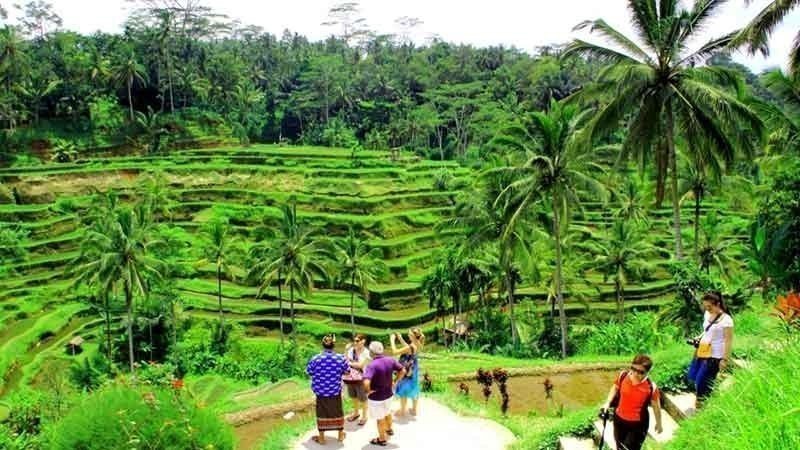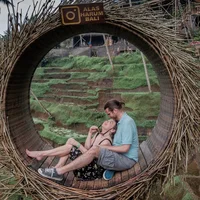Discovering Lasting Travel: The Increase of Agrotourism in Ubud
Wiki Article
Checking Out the Abundant Society and Spectacular Landscapes of Agrotourism in Ubud
Ubud, usually celebrated as the heart of Bali, presents an unique possibility for those looking for to experience agrotourism that seamlessly blends cultural splendor with breathtaking landscapes. As tourists browse with Ubud's dynamic tapestry of practices, they are invited to discover the stories behind each social practice and landscape feature.Uncovering Ubud's Cultural Heritage
Snuggled in the heart of Bali, Ubud serves as a lively center for those eager to explore the island's abundant cultural heritage. Recognized for its artistic customs, Ubud is a center where old techniques fulfill contemporary expressions, developing a distinct tapestry of social experiences. Site visitors are drawn to its myriad of galleries, temples, and workshops, each using a look into Bali's artistic and historical heritage.Central to Ubud's cultural appeal is the Ubud Palace, a substantial spots that stands as a testament to the area's imperial heritage. The royal residence regularly holds typical dance efficiencies, offering an authentic understanding into Balinese storytelling via dance and songs. Furthermore, the streets of Ubud are lined with galleries showcasing works of both distinguished Balinese musicians and emerging abilities, reflecting the island's dynamic art scene.

Immersive Agricultural Knowledge

In addition, Ubud's agrotourism campaigns typically include workshops on sustainable farming methods. These workshops stress the significance of organic farming, permaculture, and biodiversity conservation, usually under the assistance of well-informed experts. They serve as an educational system for travelers, fostering a deeper gratitude for the details of sustainable agriculture.
In addition, visitors can check out coffee and cocoa vineyards, where they find out about the procedures of growing and production. Guided trips provide detailed explanations of each action, from bean to mug or cocoa shell to delicious chocolate bar, enhancing the overall understanding of these considerable farming products.
These immersive experiences not only enrich visitors' understanding of Ubud's farming heritage but additionally advertise sustainable tourism practices, ensuring the conservation of these social landscapes for future generations.
Picturesque Rice Terraces and Landscapes
Structure on the immersive farming experiences, visitors are attracted to the exciting breathtaking rice terraces and landscapes that specify Ubud's countryside. The subak irrigation system, a UNESCO-recognized social heritage, showcases a old and sustainable technique of water administration that continues to sustain neighborhood agriculture.As visitors go across the winding paths through the balconies, they are consulted with panoramic sights that extend throughout green fields, punctuated by swaying coconut palms and the distant shape of Mount Agung. The landscape gives a tranquil backdrop that welcomes consideration and gratitude of nature's charm (Agrotourism in Ubud). For those curious about digital photography, the ever-changing light and darkness cast by find out here the sunrise or sunset supply numerous possibilities for capturing stunning photos
Beyond the terraces, Ubud's rolling hillsides and lavish vegetation develop a varied tapestry that beckons expedition. Hiking routes meander via these landscapes, allowing visitors to get in touch with the land and experience the tranquil rhythm of rural life.
Farm-to-Table Culinary Delights
Amidst the natural charm of Ubud's landscapes, the farm-to-table activity supplies an authentic culinary experience that connects site visitors with the region's agricultural heritage. This method commemorates the symbiotic relationship in between the land and its produce, with regional ranches providing fresh, organic active ingredients to Ubud's ingenious chefs. Site visitors are welcomed to take part in a gastronomic trip where the beginnings of each ingredient are transparently showcased.In Ubud, farm-to-table eating transcends mere usage; it comes to be an instructional experience. Restaurants usually supply led excursions of the ranches supplying their cooking areas, permitting diners to witness lasting farming practices firsthand. This link promotes a deeper admiration for the meticulous treatment that enters into cultivating the crops and increasing animals.
The cooking offerings show the rich variety of Home Page Ubud's farming landscape, including meals that highlight seasonal fruit and vegetables and standard Balinese tastes. From lively salads teeming with exotic greens to fragrant curries instilled with fresh natural herbs, each plate is a testimony to the area's bountiful harvests.
Furthermore, the farm-to-table principles sustains regional farmers and neighborhoods, ensuring that farming customs are preserved while promoting financial sustainability. This activity highlights a dedication to quality, sustainability, and the celebration of Ubud's one-of-a-kind terroir.
Involving With Regional Artisans
Numerous visitors discover themselves captivated by the elaborate workmanship of Ubud's regional artisans, whose work mirrors the area's abundant social heritage. These craftsmens, commonly masters of their craft, add considerably to Ubud's vivid social landscape. From typical batik textiles to meticulously carved wood artefacts, each item narrates linked with generations of know-how and practice.Involving with these craftsmens provides an unique possibility to dig much deeper into Balinese society. Several workshops use hands-on experiences, where visitors can discover techniques given through centuries. These interactive sessions not just foster recognition for the craftsmens' abilities however also offer a purposeful connection to the area's history and customs.
Site visitors can check out artisan villages such as Mas, renowned for its fine timber carvings, or Celuk, popular for charming silver precious jewelry. Here, one can witness the dedication and accuracy needed to develop each work of art. Purchasing directly from these craftsmens makes certain that the earnings sustain regional areas and sustain standard practices.
In Ubud, engaging with neighborhood artisans is not merely a traveler task; it is an improving cultural exchange that improves the agrotourism experience, leaving site visitors with a deeper understanding and recognition of Bali's artistic heritage. - Agrotourism in Ubud
Conclusion
The exploration of Ubud's agrotourism uses a profound admiration for see this website Balinese cultural heritage and all-natural elegance. The combination of typical dance, hands-on farming, and impressive rice terraces creates an one-of-a-kind tapestry of experiences that mesmerize site visitors. The farm-to-table culinary offerings display the area's agricultural bounty, while interactions with regional artisans supply understanding into Ubud's rich creative traditions. Collectively, these elements cultivate a much deeper understanding and admiration of Ubud's enduring cultural and natural appeal.Central to Ubud's social appeal is the Ubud Palace, a considerable landmark that stands as a testament to the region's imperial heritage.Ubud provides a myriad of immersive agricultural experiences that allow visitors to involve deeply with the island's agricultural way of living.Building on the immersive farming experiences, visitors are drawn to the captivating breathtaking rice balconies and landscapes that specify Ubud's countryside.In the middle of the all-natural elegance of Ubud's landscapes, the farm-to-table movement uses an authentic culinary experience that attaches site visitors with the area's agricultural heritage.Several visitors discover themselves astounded by the intricate workmanship of Ubud's neighborhood artisans, whose work reflects the region's rich cultural heritage.
Report this wiki page